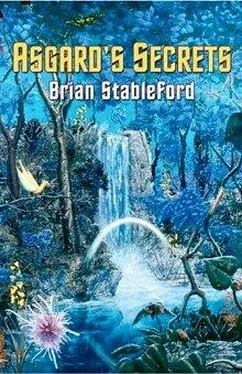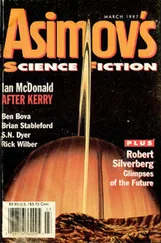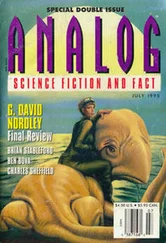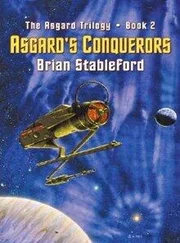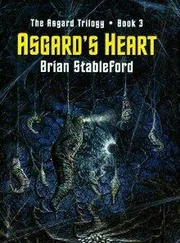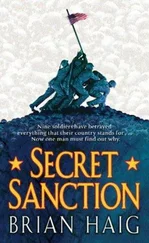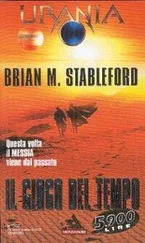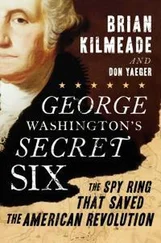She was struggling to get to grips with the catalogue of possibilities. “So the most likely story,” she said, “is that this was once a planet just like Earth—until it needed shielding from some kind of… cosmic threat. At which point its inhabitants built several layers of armour around it.”
Her choice of vocabulary was revealing—but she was fresh from smashing up a planet.
“We haven’t found any guns,” I told her. “There’s no evidence that Asgard was a fortress.”
“No?” she said sceptically. “It’s a steel ball the size of a giant planet, and when you scratch the surface you find another steel ball inside it, and then another… except that scratching the surface is all you’ve done. A trapdoor here, a trapdoor there, all going down into the living-quarters. What makes you think that the guns aren’t all around us, securely locked away?”
Asgard certainly wasn’t made of steel, but I didn’t want to quibble about trivia. “The Tetrax,” I said, “think it was all a matter of cosmic dust clouds and natural catastrophes. The habitats they’ve explored seem to have been occupied by closely-related but distinct species, living harmoniously together.”
“There you are, then,” she said. “Good neighbours need common enemies. Stands to reason.”
“Not on Asgard, it doesn’t,” I contradicted her. “There are hundreds of different species here, living together more-or-less peacefully… except for the vormyr, and the Spirellans… and the humans.” I could see why she might think that my argument wasn’t very strong, given what we’d all been through in the last couple of days.
“You say the planet drifted into this system,” she said. “Where from?”
I shrugged. “Nobody knows,” I said, “but there’s not that much dust in the immediate vicinity, so it must have come a long way—maybe as far as that” I pointed upwards.
“The black galaxy?”
“It seems unlikely, given the pace it would have to have traveled—but there are some very adventurous theorists on the fringes of the C.R.E. Some suggest that the outer layers might have been abandoned for the duration of the voyage, but now that Asgard’s reached its destination they’ll be looking to come up from the depths again some time soon.
And by the time the black galaxy looks like it’s catching up with them, a hundred million years down the line, they’ll doubtless be moving on again, towards the far rim—carefully skirting the black hole in the middle. All type two civilizations are nomads, they reckon. They’re really looking forward to the day of re-emergence, because they reckon that what we’ll learn will be our ticket to type two status… or, to be strictly accurate, the Tetrax’s ticket to type two status.”
“But you don’t believe that.”
“I try to keep an open mind,” I told her. “One day, I’ll find out the truth; in the meantime, I’m willing to be patient.”
“How are they supposed to have moved the world out of one galaxy and into another?”
“Some application of the frame force we haven’t figured out yet. Our starships can only make starship-sized whizz-bangs, but the limit’s in the hardware, not the physics—or so I’m assured. I can’t handle the math myself.”
“I think it’s a matter of energy-expense,” she said. “To make a teleportal capable of swallowing a planet, you’d need the energy of a small star inside your planet… which is presumably why some of your local theorists think there is a small star inside the artefact, not just a boring old planetary core.”
She was beginning to enter into the spirit of the enterprise. Given long enough, I figured that I really might be able to educate her in the Romance of Asgard.
“You’ve got it,” I said. “Back home, we only have little fusion reactors—but again, the limit’s in the hardware, not the physics. Even nature can make stars. Who knows what type two civilizations might be able to do, given that they’re defined as the kinds of civilizations that make use of the entire energy-output of a star.”
“Except that we haven’t found any yet.”
“ Yet being the operative word. All the humanoids in our neighbourhood are babes-in-arms, just like us… and none of them could even dream, as yet, of building something like Asgard.”
“Not even the Tetrax,” she said thoughtfully.
“Not even the Tetrax,” I agreed. “But they’re the ones who own Asgard, or think they do. They get other people to do their spadework for them, because it makes for harmonious relationships with the other local species, and because that’s the way their minds work. They think that if they sit back and relax in Skychain City, everything will come back to them in its own time. So far, it always has.”
“Nobody else ever had a warship in orbit around the world,” Susarma Lear observed, in a carefully neutral manner.
“It’s not as simple as that,” I said. “You might have trashed Salamandra, but we’re not nearly ready to take on any of our other neighbours, let alone all of them.”
“I know that,” she assured me. “Still—that little black book could be valuable, couldn’t it? If your friend Saul really did find what he thinks he found, that is.”
“I’ve glanced through the relevant pages,” I told her. “As soon as your man’s had enough sleep to take the driving-seat, I’m going to look at it a little more closely, and as soon as I’ve caught up with my own sleep I’m going to give it my fullest attention. It’s not exactly an autobiography written for publication—it’s a set of directions Saul thought he’d be following himself, and didn’t particularly want anyone else to be able to follow—but if it means what I think it means, Saul really did find a way down… not to five, but much further. To somewhere warm.”
“Well, if there’s a little star in the middle of the artefact,” the star-captain said brutally, “I should think it would be warm down there. It gets very hot if you burrow down far enough on Earth, and that’s only molten iron.”
“Actually,” I said, “ chaud is only one of the words he used. The other was vif. That means alive. If he meant it literally…”
“I’m under orders here, Rousseau,” she said, after a moment’s hesitation. “Just like you. Our objectives are limited. Once the android is dead… well, I have obligations to my men as well as to my superior officers. I’m not going chasing wild geese, Rousseau—let’s be clear about that. Neither are you.”
That’s what you think , I thought—but what I said was: “Yes, captain. Understood.”
Actually, I did understand. I could see that the star-captain’s priorities were bound to be different from mine. She had orders to follow, and she was on some kind of mopping-up mission in the wake of what must have been a very nasty conflict. Even so, she’d shown a glimmer of interest, a hint of vulnerability. I resolved to work on her again—but I knew that the chance wouldn’t arise for a while. She went back to her bunk long before Serne woke up, and by the time he came to take over the wheel I was utterly exhausted. I didn’t have the energy to give him much of a driving lesson, but he assured me that a truck was a truck, so I left him to it. The star-captain moved in her sleeping bag as I went back into the cabin, but she didn’t wake up. Whatever nightmare she was dreaming had her securely in its grip.
I couldn’t keep my eyes open; the notebook would have to wait.
I slept for eight hours, but the star-captain was still asleep when I woke up again. I checked that Serne was still okay before I began to go through Saul’s notes for a second time, much more assiduously than before. I concentrated hard, even though I intended to go through them as many times more as I possibly could before I ditched the book. I didn’t start cooking breakfast until the star-captain woke up. She had to be feeling a lot better, but she still didn’t seem relaxed.
Читать дальше
